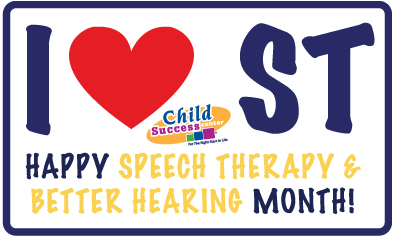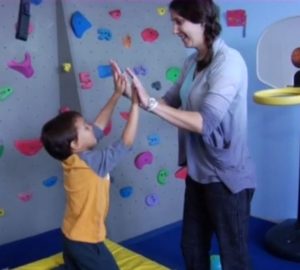Taking a Look at Speech Therapy
Paying Special Recognition to Speech Therapists during Better Hearing and Speech Month

Communication is a fundamental skill that lays the foundation for how each of us will flourish and interact in society. Its importance cannot be understated, which is why every May we pay special recognition to Better Hearing and Speech Month, and the therapists that do the amazing work with our kids.
Our speech therapists shine a light on some common challenges that can affect a significant percentage of children during their key developmental years – and if left untreated, can have severe physical and psychological implications.
Speech challenges in children can exhibit overt symptoms such as delayed language development, but they also can lead to behavioral, self-esteem and de-motivational issues. Some speech challenges can be ‘grown out of,’ however, others left untreated can lead to more severe problems down the road. To better understand Speech Articulation and the therapy process, Child Success Center’s Licensed Speech Pathologists share keen insights about the potential challenges and successes – and general information – that parents want regarding ways to help their child’s specific needs in this area. Here are their responses to several essential questions surrounding these issues:
What are the greatest challenges you deal with as a therapist?
“As therapists, we are always challenged with coming up with new and creative ways to do therapy. Some children are very receptive to therapy and are very compliant. Other children demonstrate avoidance behaviors, may lack internal motivation or challenge the therapist behaviorally. It takes a special therapist to have patience, understanding, compassion and creativity to pull out the best in each child. This is the beauty of experience.”
What has been your greatest success story?
“I worked with a child years ago who was 2 years of age and had apraxia of speech – with only 10 words at the time. Most 2 year olds have 200-300 words. His father was a very involved parent, but needed a lot of guidance in understanding how to communicate with his son. He often drilled him with questions putting him on the spot, causing him to “shut down” when he talked to him. The father was very educated and successful in his career, however, I could sense that he did not feel success with being a parent due to this child’s communication deficit. After 6 months of treatment, both the child and the father, who also attended the weekly sessions, made huge gains. The father learned how to be a better communication partner with his son and the experience significantly changed the dynamics between them. With therapy a success, I formally assessed the little boy and his communication skills were above his peers. On the last day of therapy, his father cried and was so grateful. That was beyond rewarding for me!”
“Hearing a 3-year old child with a diagnosis of apraxia of speech say his nanny’s name for the first time without any help was one of the highlights for me. This child was known to simplify the words in his vocabulary to very similar and short words (mama, dada, nana, pa, ba, etc.). In (therapy), he was trying to share a story about his former nanny after Skyping with her the previous evening, and independently said his nanny’s full name. His mother began to tear up. It was that feel good moment that you want as a therapist with every client you treat.”
So parents can better understand the process, for the most common cases, what changes, other than in speech, do you observe in clients you work with?
“We can see more confidence and less frustration with most of the kids. Some children are teased by their peers because of their communication problems. I find that kids can become more confident in interacting with their peers too.”
“One of the most amazing and beautiful things that speech therapy does, is it helps children learn to be comfortable in uncomfortable situations. In therapy, you have to help kids learn new skills and sometimes they don’t want to do the work. It gives them the confidence to work through their discomfort and know that they will eventually be successful with practice.”
“Therapy is a confidence booster for parents too. Some parents are shocked by what we can get out of their kids. They can’t believe that their child is willing to do the work and be pushed at times. It gives a parent a sense of pride in their child.”
 “As children progress through therapy they begin to show more confidence in their skills. We see children start to stand taller, walk taller, and use a louder, more appropriate voice when unfamiliar faces are near. However, these are also the children who teach us as therapists to “think on our toes,” or else they may use their new found skill to escape their work task.”
“As children progress through therapy they begin to show more confidence in their skills. We see children start to stand taller, walk taller, and use a louder, more appropriate voice when unfamiliar faces are near. However, these are also the children who teach us as therapists to “think on our toes,” or else they may use their new found skill to escape their work task.”
What are the most common questions parents will ask?
“Parents typically want to know how long the therapy process will take? This is always a difficult question to answer as the time varies from child to child. It may take 3 months, but it could take over a year. It depends on why the child is coming to therapy, what are the speech errors, how many errors, what type of errors, etc. There are a lot of factors to consider which makes that question one of the most difficult to answer.”
“They ask what therapy is like and how will they get their child to do the work. They also want to know what reason they should give their child for going to speech therapy. They ask if the problem will go away on its own – without therapy. They often ask if they have done something to create this problem (parents often blame themselves).”
What are the most common questions kids will ask, if any?
“Kids often want to understand why they are coming to speech therapy (especially the older ones). As they continue to come and they are in the final stages of therapy, they want to know when they will be graduating and what we do for graduation parties. They often ask about the kind of toys and games we play?”
Child Success Center is unique from other therapy facilities because it features a fully equipped and kid friendly gymnasium that the kids love to explore. How do you use the gym to help clients and why is it effective?
“The gym is a great tool to motivate kids. We sometimes use the gym as a reward in the middle or end of our sessions. It’s also great for children who are not regulated and need movement to help them feel more regulated in their bodies. Children that have high arousal levels and children who are under aroused benefit from speech work in the gym to help them stay internally organized and regulated. This helps them to attend more to the speech work and also helps motivate them. Physical movement helps jump start the communication centers in the brain.
“We see many children ranging in age from 2 years old to 12 years old. These children always enjoy knowing that they have gym time after working hard in speech. For other children, the gym is used to help the child during the speech session. These children typically benefit from the repetition of drilling for specific sounds, requesting by using language, and by utilizing the gym equipment. For these children, sitting in a chair at a desk is not the ideal situation because their body may need vestibular and proprioceptive input. When working with these children, the occupational therapists are amazing at providing tips to help improve a speech session. These tips may include providing the child with heavy work (e.g. climbing, moving pillows around) to help regulate a child or swinging in a specific manner (e.g. linear movement, spinning, etc.) and even jumping.”
More information on Better Hearing and Speech Month
More information on Speech Therapy at Child Success Center

